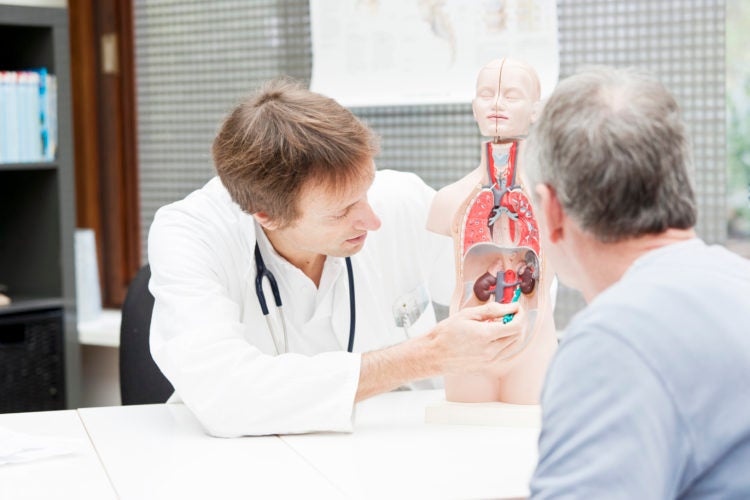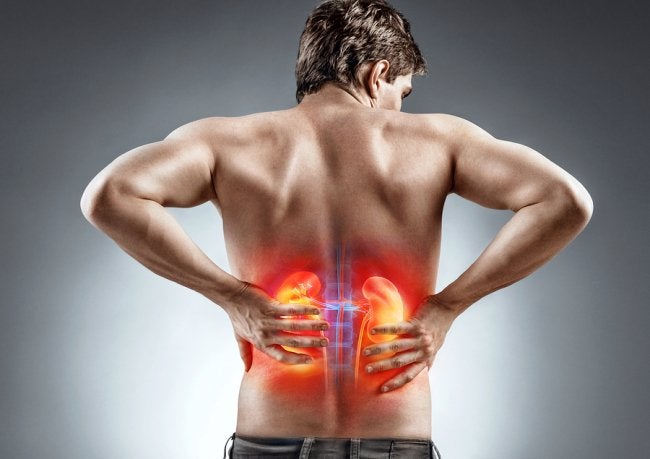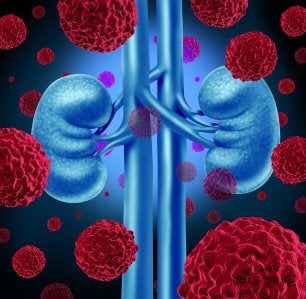-
Spotlight on the Symptoms of Kidney Cancer

The kidneys are found in the lower back. Each kidney is about the shape of a fist. When cancer cells develop in one or both of these organs, it’s referred to as kidney cancer. Like all forms of cancer, early detection is crucial for the most favorable outcome. Unfortunately, the signs and symptoms of kidney cancer don’t typically develop until the later stages of the disease. If you do notice anything abnormal, talk to a urologist right away. Prompt medical care could save your life.
Urologic Symptoms
Urologic symptoms are changes that involve the urinary system or region. Some patients with kidney cancer report having low back pain on one side that isn’t caused by an injury. It may also be possible to feel a lump or a mass in this area. Hematuria is another possible urologic sign of kidney cancer. This refers to blood in the urine. The urine may look pinkish, red, or even darker, like cola. Note that hematuria can also be caused by urinary tract infections (UTIs), kidney infections, and bladder or kidney stones. Seeing blood in the urine doesn’t automatically mean that you have cancer. However, you should consult a urologist promptly, and hematuria should never be considered “normal.”
Systemic Symptoms
In addition to the localized symptoms, patients may experience symptoms that can affect the whole body. Excessive fatigue is one example of a systemic symptom. Others include unintentional weight loss not caused by dieting and a persistent fever that isn’t caused by an infection. Some patients may report a loss of appetite. Because of the excessive fatigue, patients may have a blood test to check for anemia. Those with kidney cancer may be diagnosed with a low red blood cell count.
You’ll find state-of-the-art diagnostics and cutting-edge care at Urology Associates, P.C. Our cancer treatment specialists in Tennessee focus on treating the whole patient by developing personalized treatment plans and providing compassionate, attentive care. You can call us at (855) 901-1338 to request a visit with one of our highly trained urologists.
-
Detecting Kidney Cancer

You have two kidneys located deep within your lower back, on either side of your spine. Their job is to remove waste products from the bloodstream, which are then expelled as urine. As with other cancers, the sooner a urologist diagnoses kidney cancer , the better. Early treatment can lead to a more favorable outcome.
Signs and Symptoms of Kidney Cancer
In the absence of symptoms, kidney cancer can be tricky to detect during routine physical exams. Family care doctors can palpate certain areas of the body to check for abnormalities. Women can receive breast exams, for example, to check for possible tumors. Unfortunately, this isn’t possible with the kidneys because they are too far beneath the skin’s surface. Instead, the detection of kidney cancer relies on the patient’s observations and risk factors. Talk to your doctor if you notice some of these possible signs of kidney cancer:
- Bloody urine
- Unexplained low back pain
- Loss of appetite
- Fatigue
- Persistent fever not caused by an infection
- Anemia
- Unintentional weight loss
Screening Tests for Kidney Cancer
Kidney cancer isn’t as common as skin or breast cancer, and there aren’t any routine screenings recommended for the average patient. Some people who are at a high risk of kidney cancer might have routine screening tests. Usually, a kidney cancer screening involves an imaging test, such as a magnetic resonance imaging (MRI) or computed tomography (CT) scan. Ultrasound is another possibility. Some urologists might also recommend periodic urine tests to check for the presence of blood.
Risk Factors of Kidney Cancer
These screening tests aren’t recommended for people at an average risk of kidney cancer. Consider asking your doctor about your risk factors. Some inherited conditions, including von Hippel-Lindau disease, can raise the risk of this cancer . A family history of one of these inherited conditions, or of kidney cancer itself, may be cause for a referral to a genetic counselor.
Kidney cancer is one of the many diseases we treat here at Urology Associates, P.C. Our sophisticated cancer treatment options in Nashville are combined with our personalized, patient-centered approach. If you’ve been referred to a urology specialist, you can get in touch with our friendly office staff at (855) 901-1338.
-
Understanding Kidney Cancer
Finding out that you have kidney cancer can be overwhelming. By working closely with your urologist on understanding your disease and developing a cancer treatment plan, you will feel more in control of your health and outlook. In this video, Dr. David Morris of Urology Associates in Tennessee explains the basics of kidney cancer.
Typically, kidney cancer is indicated by the presence of solid masses on the kidneys. It does not respond to chemotherapy and is usually surgically treated. If the cancer has spread, further treatment may be necessary.
If you are concerned about kidney cancer in Tennessee, make an appointment with one of our urologists today. We treat a range of issues, from urologic cancers to erectile dysfunction. To schedule a consultation, call Urology Associates at (888) 329-7700.
-
Exploring Kidney Cancer Risk Factors
 Kidney cancer accounts for approximately 3% of all adult cancers in the United States. This number may seem insignificant on its own, but when you consider that it translates to approximately 32,000 new cancer cases annually the number doesn’t seem so small. Kidney cancer claims about 12,000 lives each year, most of whom are men between the ages of 50 and 70. Although we don’t yet know what causes kidney cancer, we do recognize that certain risk factors are linked to an elevated risk for developing the disease. If you can positively identify any of these kidney cancer risk factors, schedule a screening with a urologist in Nashville .
Kidney cancer accounts for approximately 3% of all adult cancers in the United States. This number may seem insignificant on its own, but when you consider that it translates to approximately 32,000 new cancer cases annually the number doesn’t seem so small. Kidney cancer claims about 12,000 lives each year, most of whom are men between the ages of 50 and 70. Although we don’t yet know what causes kidney cancer, we do recognize that certain risk factors are linked to an elevated risk for developing the disease. If you can positively identify any of these kidney cancer risk factors, schedule a screening with a urologist in Nashville . Unhealthy Lifestyle Habits
Certain lifestyle habits that might be considered unhealthy have shown a causal link with kidney cancer. Smoking, for example, increases the risk of getting kidney cancer. People who are overweight and have a poor diet are also at a higher risk of getting kidney cancer . You might also be at risk if you are regularly exposed to certain chemicals that increase the risk for kidney cancer, including cadmium, herbicides, and certain organic solvents.Inherited Conditions
Kidney cancer can sometimes be caused by one of six rare inherited conditions. Although people who have these conditions account for only a small portion of total kidney cancer patients overall, people who have these conditions have a much higher risk for developing kidney cancer compared to others. These inherited conditions are:- Birt-Hogg-Dube syndrome
- Family renal cancer
- Hereditary papillary renal cell carcinoma
- Hereditary leiomyoma-renal cell carcinoma
- Hereditary renal oncocytoma
- Von Hippel-Lindau disease
Certain Medications
Phenacetin, a once popular pain-reliever, has been linked to kidney cancer but has not been prescribed in the United States for over 20 years. Today there are certain drugs used to treat high blood pressure that have been linked to an elevated risk of kidney cancer, though it’s not clear whether the link is related to the medication or the high blood pressure. Ask your doctor if any of the medication you are on has been shown to elevate one’s risk for kidney cancer.If you are worried that you might be at risk for kidney cancer, visit Urology Associates P.C. for a cancer screening. We are the leader in urological care in Nashville and throughout Tennessee. If you are diagnosed with kidney cancer, we provide the most advanced and aggressive kidney cancer treatment to help you recover. Call us toll-free at (888) 329-7700 to find a urologist in your area.
Recent Posts
categories
- Uncategorized
- Bladder Cancer
- Women's Sexual Health
- MonaLisa Touch
- Urology
- Urologist
- Erectile Dysfunction
- Kidney Cancer
- Incontinence
- Prostate
- MonaLisa Touch Laser Treatment
- Kidney Stones
- Urinary Tract Infections
- Event
- Sexual Dysfunction
- Testicular Cancer
- Prostate Cancer
- Urology Surgery Center
- urinary incontinence
- vaginismus
- noncoital pain disorder
- Hypoactive Sexual Desire Disorder
- Infographic
- provenge
- Xofigo
- robotic surgery
- hormone replacement
- diabetes
- renal cell carcinoma
- pelvic pain
- hematuria
- sexual health
- chronic testicular pain
- premature ejaculation
- Men's Health Clinic
- Dr. Melvin Seard
- Interstitial Cystitis
- vasectomy
- overactive bladder
- vaginal atrophy
- nocturia
- bladder infections
- urethral strictures
- Acute Epididymitis
- low sex drive
- circumcision
- pelvic floor dysfunction
- Peyronie's Disease
- prostatitis
- female sexual dysfunction
- varicocele
- difficult urination
- low libido
- PSA levels
- male fertility
- penile prosthesis
- prostatic intraepithelial neoplasia
- male infertility
- estrogen levels
- nurse navigator
- stress urinary incontinence
- vaginal yeast infection
- elevated psa
- painful sex
- adult circumcision
- epididymitis
- OAB
- kidney infection
- penile cancer
- pelvic organ prolapse
- Vasectomy Reversal
- bone health
- cystectomies
- clinical trials
- bloody urine
- Advanced Therapeutic Center
- WISH MedSpa
- neurogenic bladder
- WISH Team
- prostate biopsies
- BPH
- fecal incontinence
- lithotripsy
- osteoporosis
- kidney cysts
